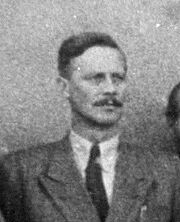Fidél Pálffy facts for kids
Quick facts for kids
Count Fidél Pálffy
|
|
|---|---|

Count Fidel Pálffy, 1944
|
|
| Born |
Fidél Pálffy de Erdőd
6 May 1895 Szentgyörgy, Austria-Hungary (now Svätý Jur, Slovakia)
|
| Died | 2 March 1946 (aged 50) Budapest, Hungary
|
| Cause of death | Execution by hanging |
| Citizenship | Hungarian |
| Known for | Politician and nobleman |
| Title | Minister of Agriculture |
| Political party | Hungarian National Socialist Party Arrow Cross Party |
| Spouse(s) | Irén Filipanits |
| Children | Klára, Irén, Alexandra |
Count Fidél Pálffy (born May 6, 1895 – died March 2, 1946) was a Hungarian nobleman. He became known as a strong supporter of the Nazi movement in Hungary during a difficult time in history.
Contents
Early Life and Challenges
Fidél Pálffy served in World War I. After the war, he lived on a large property in what is now Slovakia. He later returned to Hungary. The Great Depression in 1929 caused him to lose all his money.
Political Activities
In 1933, Fidél Pálffy started a political group called the Hungarian National Socialist Party. He later joined it with other similar groups. By 1935, he was in charge of this combined group. However, his group did not become very popular.
Pálffy then looked for support from Germany. He worked with other politicians like László Baky and Ferenc Szálasi. They tried to create a new political party that supported Germany. In 1941, he successfully restarted the Hungarian National Socialist Party with Baky. This party was different from the Arrow Cross Party.
Role During World War II
During World War II, some powerful groups in Germany thought Pálffy could lead Hungary. He also became an important contact for Wilhelm Höttl, who worked for a German intelligence agency.
Pálffy served as the Minister of Agriculture when Germany had a lot of influence in Hungary. After the war, he was accused of helping the Nazi regime. He was put on trial for treason.
Trial and Outcome
Fidél Pálffy was one of the first government officials to be tried after the war. There was not much evidence of specific crimes he had committed. However, his writings and his role in the government were used against him. His status as a member of a well-known noble family also played a part. Fidél Pálffy was found guilty and was executed in March 1946.
Images for kids


